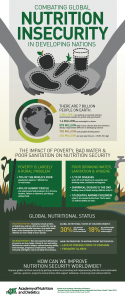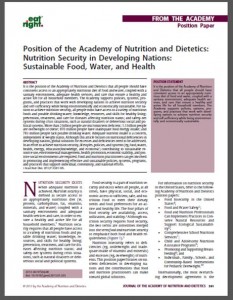
Stacia Nordin, co-founder of Never Ending Food, co-authored the position paper of the Academy of Nutrition and Dietetics (AND) on Nutrition Security in Developing Nations. AND is America’s largest professional organization dedicated to issues of food and nutrition. Many of its over 70,000 members are Registered Dietitians (RD) who, like Stacia, play an important role in the improvement of research, education, implementation, policy and advocacy of issues relating to food and nutrition.
This paper reflects the peer-reviewed position of the Academy on issues pertaining to global nutrition security within the context of sustainable food, water, and health. The abstract of this paper reads as follows:
“It is the position of the Academy of Nutrition and Dietetics that all people should have consistent access to an appropriately nutritious diet of food and water, coupled with a sanitary environment, adequate health services, and care that ensure a healthy and active life for all household members. The Academy supports policies, systems, programs, and practices that work with developing nations to achieve nutrition security and self-sufficiency while being environmentally and economically sustainable. For nations to achieve nutrition security, all people must have access to a variety of nutritious foods and potable drinking water; knowledge, resources, and skills for healthy living; prevention, treatment, and care for diseases affecting nutrition status; and safety-net systems during crisis situations, such as natural disasters or deleterious social and political systems.
More than 2 billion people are micronutrient deficient; 1.5 billion people are overweight or obese; 870 million people have inadequate food energy intake; and 783 million people lack potable drinking water. Adequate nutrient intake is a concern, independent of weight status. Although this article focuses on nutritional deficiencies in developing nations, global solutions for excesses and deficiencies need to be addressed. In an effort to achieve nutrition security, lifestyles, policies, and systems (eg, food, water, health, energy, education/knowledge, and economic) contributing to sustainable resource use, environmental management, health promotion, economic stability, and positive social environments are required. Food and nutrition practitioners can get involved in promoting and implementing effective and sustainable policies, systems, programs, and practices that support individual, community, and national efforts.”
The paper provides an overview of the global issues including: the extent of nutrition insecurity; factors which contribute to nutrition insecurity; promising programs; a list of nutrition security organizations; and interactions needed for optimal nutrition between: healthy Natural Resources, Individual Choices, and Societal Systems.
The paper also addresses the roles and responsibilities of food and nutrition practitioners in terms of helping to find solutions to the achievement of nutrition security on a global level. Some of these solutions include:
- Helping to promote an awareness of global nutrition security issues.
- Learning about, respecting, and understanding diverse customs and cultures.
- Writing articles for local newspapers, professional associations, political leaders, and newsletters.
- Encouraging support for global and domestic outreach efforts promoting nutrition security.
- Becoming actively involved to ensure nutrition security programs support sustainable development.
- Establishing classes on global nutrition security issues.
-
Networking by joining professional and internationally focused interest groups.
- Volunteering in local, national, or international humanitarian assistance efforts and medical missions.
- Taking a class in global nutrition.
- Learning more about the ramifications of domestic policy decisions on world food security.
- Learning about the policies, programs, and issues related to nutrition security.
- As the nutrition experts, registered dietitians and dietetic technicians, registered, can provide continuing education seminars to other nutrition and medical professionals.
- Becoming more “green” as you make personal choices.
- Teaching others how changes in their eating and purchasing practices can reduce consumption of the world’s nonrenewable resources.
- Supporting sustainable food and water efforts locally and internationally (eg, gardening, water filtering, well construction, fish ponds, and reforestation).
- Learning more about organizations and programs involved in issues related to nutrition security.
Stacia has been a member of the Academy of Nutrition and Dietetics (AND) since 1989. In 1997 she joined AND’s international affiliate, the American Overseas Dietetic Association (AODA), of which she served as President from 2008-2009. In 2001 Stacia won the International Dietetic Network ‘Star Award,’ in 2005 she was given the ‘Service Award’ which recognizes valuable contributions to the AODA, and in 2009 she was honored as the ‘Outstanding Dietitian of the Year’ –the highest award given by the American Overseas Dietetic Association. She has also been active on several of AND’s special interest groups, including the Hunger and Environmental Working Group (HEN), of which she received the 2011 award for ‘Excellence in Hunger and Environmental Nutrition’. This year, 2013, Stacia was selected by Today’s Dietitian Magazine as one of the top 10 Registered Dietitians who are making a difference in the world!
Congratulations again to Stacia for all the hard work and time that she dedicated to making this paper a reality! And thank you for your tireless effort of helping to make this a better world in which to live (and eat)!

